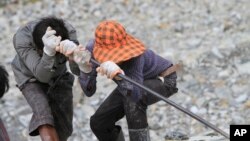PHNOM PENH —
Two years ago, a ceremony was held in Rovieng district, a remote area in the northern province of Banteay Meanchey, to herald the construction of a major steel plant here.
The much-touted plant would make use of iron ore found here. It was to be a joint operation between Cambodia and China worth more than $11 billion, and it was supposed to include 400 kilometers of railway to connect to a new port in the coastal province of Koh Kong.
So far, though, no construction work has been done, and residents in Rovieng say they doubt it ever will be. That means the jobs that were supposed to come with it won’t arrive either.
Residents in Rovieng say too that the Cambodia Iron and Steel Industry Group, the company at the heart of the plan, has been permitting smaller companies to extract the iron ore that made it appealing in the first place.
“What we see now are many piles of rocks transferred by trucks, but no sign of a steel plant,” said Svay Pheun, who lives three kilometers away from the ore site. The site is guarded by soldiers, and no one is allowed in, he said.
Koh Kong Governor Bun Leut told VOA Khmer there is no sign of port construction, either.
Meanwhile, few official documents are public on the project, making it impossible to assess its progress. In the original briefing paper on the project, a 99-year lease would go to Cambodia Iron and Steel, which would use regional coal for a power plant and iron ore in the region to produce steel. At the time, millions of tons of iron were expected to come from the area annually, for more than five decades.
But in Rovieng, the start date has come and gone, there is no plant, and no one is sure if there will ever be one.
Representatives for Cambodia Iron and Steel could not be reached for comment.
Cheng Hong Bo, a spokesman for the Chinese Embassy in Phnom Penh, said he had no knowledge or documents on the Chinese companies behind the project. In the original briefing paper, four steel firms were reportedly backing the project, for 70 percent ownership.
Eang Vuthy, head of the pro-transparency organization Equitable Cambodia, in Phnom Penh, said some of the project’s partners in China are reportedly facing budget shortages due to corruption. This may have halted the project, he said. “We don’t know exactly what is going on.”
The much-touted plant would make use of iron ore found here. It was to be a joint operation between Cambodia and China worth more than $11 billion, and it was supposed to include 400 kilometers of railway to connect to a new port in the coastal province of Koh Kong.
So far, though, no construction work has been done, and residents in Rovieng say they doubt it ever will be. That means the jobs that were supposed to come with it won’t arrive either.
Residents in Rovieng say too that the Cambodia Iron and Steel Industry Group, the company at the heart of the plan, has been permitting smaller companies to extract the iron ore that made it appealing in the first place.
“What we see now are many piles of rocks transferred by trucks, but no sign of a steel plant,” said Svay Pheun, who lives three kilometers away from the ore site. The site is guarded by soldiers, and no one is allowed in, he said.
Koh Kong Governor Bun Leut told VOA Khmer there is no sign of port construction, either.
Meanwhile, few official documents are public on the project, making it impossible to assess its progress. In the original briefing paper on the project, a 99-year lease would go to Cambodia Iron and Steel, which would use regional coal for a power plant and iron ore in the region to produce steel. At the time, millions of tons of iron were expected to come from the area annually, for more than five decades.
But in Rovieng, the start date has come and gone, there is no plant, and no one is sure if there will ever be one.
Representatives for Cambodia Iron and Steel could not be reached for comment.
Cheng Hong Bo, a spokesman for the Chinese Embassy in Phnom Penh, said he had no knowledge or documents on the Chinese companies behind the project. In the original briefing paper, four steel firms were reportedly backing the project, for 70 percent ownership.
Eang Vuthy, head of the pro-transparency organization Equitable Cambodia, in Phnom Penh, said some of the project’s partners in China are reportedly facing budget shortages due to corruption. This may have halted the project, he said. “We don’t know exactly what is going on.”







